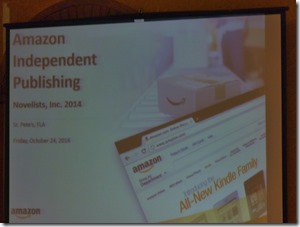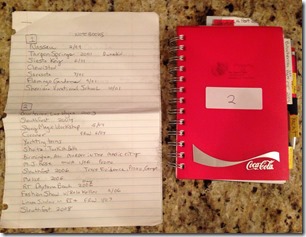Empowering Authors with Amazon Independent Publishing
Novelists, Inc. Conference Day 2, St. Pete Beach Oct. 2014
Several representatives from Amazon Independent Publishing spoke at the Novelists, Inc. Conference. They said they’ve seen consistent growth in print and Kindle books over the past few years. The Kindle growth curve exceeds print. This is a global trend as well. The adaptation to digital, when it occurs, happens fast across the world. The percentage of books sold online compared to brick-and-mortar stores is rising steadily.

Digital creates discovery through dedicated e-book readers. Kindle owners buy four times more books than before they owned one. “What’s old is new again.” Digital creates incremental demand. We release older titles, and Kindle sales of all our books increase along with print editions. In 2013, there was 90% device ownership in the U.S. with 32% of these being e-readers and 42% being tablets.
At a bookstore, you have to worry about how your book is placed and where customers can find it on the shelf. Online, you’re concerned with how customers hear about and find your books. How can your book stand out against other content? Books have to compete against all other entertainment products and pricing. So how can we grow the mind-share of people who read books?
What’s next? Global marketplaces are another focus. So are opening Kindle stores based on local experience. Reading experiences such as Kindle Voyager and Kindle reading apps. To drive discovery, we have Amazon Author Central, Goodreads, Kindle Daily Deal, and Kindle Countdown Deal.
The Author Experience
Ease-of-use with KDP, Createspace, and Audible
Better tools with a pricing tool and now a Kids Book Creator
Reimagined content through Kindle Worlds and Kindle First Day One
Author lifestyle support with Kindle Scout, WriteOn, APub, indie platforms
The Customer Experience
New models such as Kindle Unlimited
Wider functionality such as #AmazonCart
Global and Local
KDP
Benefits are that it’s easy to enroll, fast to market, global reach. Author maintains control, retains full rights, keeps up to 70% royalty. You can use KDP to publish in territories where you have the rights. The new reporting dashboard launched in February. An order is different from a sale that has cleared the bank. You can retrieve up to 90 days of data. The pricing tool suggests how much you should price your book based on various data.
Pre-order means you can promote your book up to 90 days before the launch. This helps to build sales rank. You should put a link to the next book in your series at the back of the book if possible. 10 days before, you must present the final file. There is a three day block out period prior to launch where you can’t make any further changes.
Series Promotion
Improved search and browse feature.
Be sure to put your info in the metadata.
New series landing pages for the whole series so you can see your books in order.
The next in series will appear as a buy button on devices at the book’s end.
KDP Select means you can attain higher royalties, reach new audiences, participate in special promotions. This includes the Kindle Lending Library, Kindle Countdown Deal, Kindle Unlimited. KDP books do hit the bestseller lists. Authors get paid from a global fund and can earn All-Star bonuses.
Kindle Daily Deal leads to 3000 times more sales. There’s a lasting effect. One day later, there is 110 times sales. At seven days, it’s 18 times sales. At fourteen days, it’s 5 times more sales, and at thirty days, it is 4 times more sales.
On the Kindle Countdown Deal, you get up to seven promo days. The book must be at least one dollar off the list price. There’s a countdown clock on your Amazon book page. Your book is also listed on the KCD landing page and it’s based on ranking where your book appears.
Kindle Unlimited costs consumers $9.99 per month, and this includes audio books. The Kindle Matchbook program means if you buy the new print book, you can buy the Kindle book for $2.99 or less.
Createspace offers global reach, 24/7 customer service, Kindle conversion, industry-leading royalties, free Cover Creator tool, forums, blogs, articles and videos as publishing resources. Professional services of editors and designers are available if needed. Your share of the list price: Createspace 80%; Amazon 60%; Expanded Distribution 40%–all minus a manufacturing fee.
How to Maximize your Success: Use Metadata. This can consist of keywords in terms of genres and categories that are visible at the bottom of the Kindle detail page. This metadata should be consistent across all locales.
Your Amazon Author Central page includes a book list with cover images, author photo, bio, Twitter and blog feed, videos that you upload. Readers will also see recommendations for similar authors. You can get your sales data and ranking on Author Central. Make sure your books are on Goodreads and you have an active presence there.
How to Get Reviews? Offer promotions such as permafree, KCD, etc. Publish in multiple formats, i.e. print, e-book, audio.
Author Platform: Keep up with Goodreads, Amazon Author Central, social media, email lists. Consult with other authors on ways to attract readers.
Note: Any errors in this article are due to my interpretation.
CONTEST ALERT
Win a $25 Amazon/BN gift card or free ebooks from Booklover’s Bench authors in our November contest: http://bookloversbench.com/contest/
1000 Thriller Giveaway: Enter to win a new book every week for a year: http://www.thebigthrill.org/1000-thrillers/
HANGING BY A HAIR is up for a Readers Choice BTS Red Carpet Book Award in the Mystery category. Check it out and vote here: http://btsemag.com/redcarpet/2014_ReadersChoice_Mystery.html




















